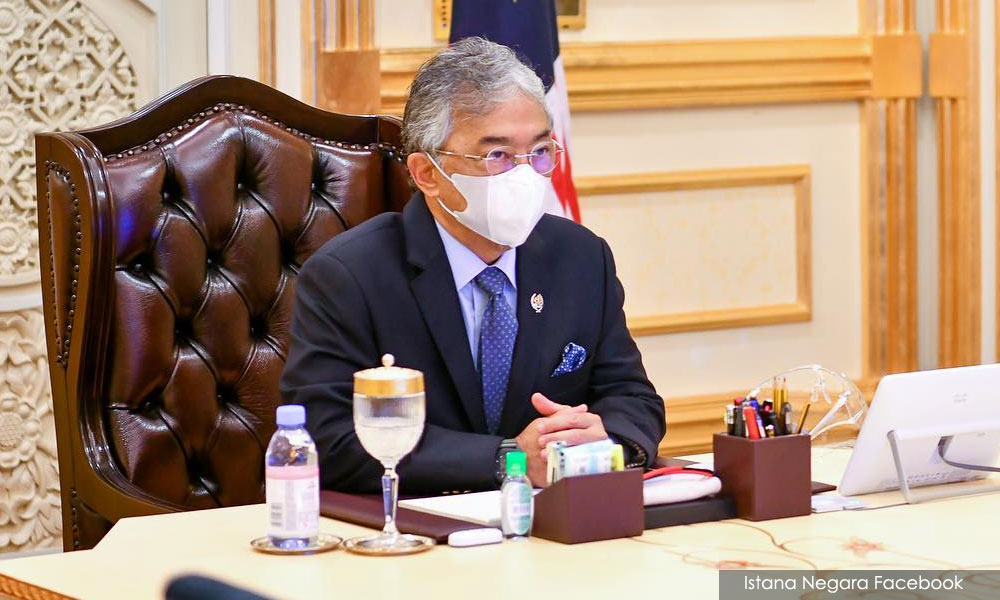The Prime Minister’s Office (PMO) in issuing the statement dated July 29 to rebut the palace’s statement issued earlier in the day, was a futile exercise to defend the Perikatan Nasional (PN) government and was gross misconduct in a most appalling and contemptuous manner.
First, the PMO’s statement in seeking to justify the wrongful actions by providing a purported chronology, suggests that the Yang di-Pertuan Agong misrepresented the facts in the palace statement. This is an affront to the royal institution and to the Agong himself.
Second, the PMO’s statement itself was misleading because it failed to admit that Takiyuddin Hassan as a minister in the Prime Minister’s Department representing the cabinet and Idrus Harun as attorney-general were instructed by the Agong to table the proclamation of emergency and the ordinances for debate and voting in Parliament.
The truth is that the cabinet has willfully and deliberately treated the Agong's instructions with total disdain by failing to act as instructed. This is disobedience at the most serious level.
Third, the PMO’s statement in referring to Article 40(1) of the Federal Constitution that the Agong is required to act in accordance with the advice of the cabinet has wrongfully treated the Agong as a mere rubber stamp or mouthpiece of the cabinet without even giving scant respect to the Agong’s position as a symbol of stability, national unity, and guardian of the constitution.
The Agong is the moral and legal compass of the nation. Sultan Azlan Shah in his essay 'The Role of Constitutional Rulers' described the powers of constitutional monarchs as follows:
“A King is a King, whether he is an absolute or constitutional monarch. The only difference between the two is that whereas one has unlimited powers, the other’s powers are defined by the Constitution. But it is a mistake to think that the role of a King, like a President, is confined to what is laid down by the Constitution. His role far exceeds those constitutional provisions.”
Takiyuddin misled Parliament on July 26 in failing to disclose the material fact that the Agong has clearly and expressly instructed for the proclamation of emergency and the ordinances to be debated and voted upon in Parliament.
The statement was made in the presence of Prime Minister Muhyiddin Yassin and all the cabinet ministers. However, no one had seen it fit to correct the material non-disclosure. Therefore, the prime minister and the cabinet must be collectively responsible for misleading Parliament and the public.

Fourth, the interpretation by the cabinet that Article 150(3) is satisfied by having the proclamation of emergency and the emergency ordinances being “laid” on the MPs table is a most dishonest argument. This argument fails to give effect to the words:
“A Proclamation of Emergency and any ordinance shall be laid before both Houses of Parliament… shall cease to have effect if resolutions are passed by both Houses annulling such Proclamation or ordinance.”
There must be debate and voting for the Parliament to pass a resolution.
Further, it is an established principle of constitutional interpretation that a broad and purposive approach taking into consideration the philosophy and historical context of the provisions must be applied.
The philosophy and historical context on the power to enact laws including emergency ordinances lie with Parliament and not the executive. The historical context and philosophy are set forth in paragraphs 174 and 175 of the Reid Commission Report.
Paragraph 174:
“We see no need to recommend that the executive should have any emergency powers to act in such a situation before Parliament enacted legislation to deal with it.”
Paragraph 175:
“Emergencies, such as war or internal disturbance, which constitute an immediate threat to the security or economic life of the country or any part of it, may have to be dealt with more promptly… if Parliament is not sitting when the Proclamation is made, the Government can make ordinances having the force of law. Parliament must be recalled as soon as possible and must approve of any such ordinances within fifteen days or otherwise the ordinances will cease to have effect.”
The period of 15 days was removed in the 1960 constitutional amendments. However, the purpose and philosophy remain. It is Parliament, and not the executive, that is to have the final say whether to approve or reject the proclamation of emergency and the emergency ordinances.
Fifth, the words in Article 150(3): “if not sooner revoke” means Parliament may by resolution annul the proclamation and ordinance when a Parliament is convened if the proclamation and ordinance have not been revoked before the sitting.
Takiyuddin misled Parliament and the public when he announced that the proclamation and ordinances had been revoked on July 21 when this was not true.
Only the Agong can revoke the proclamation and ordinances and the revocation can only take effect when it is gazetted, which has not been done. Again, the prime minister and the cabinet are collectively responsible because not one of them corrected the misstatement from July 26 to 29 until the palace issued the statement.
In the circumstances, the PN government has committed serious breaches and misconduct. The PN government must resign immediately.
Pakatan Harapan Legal Committee
- William Leong Jee Keen (PKR-Selayang)
- Mohamed Hanipa Maidin (Amanah-Sepang)
- Ramkarpal Singh Karpal Singh (DAP-Bukit Gelugor)
- Sivarasa Rasiah (PKR-Sungai Buloh)
- Muhammad Faiz Fadzil (Amanah-Permatang Pasir)
- Fadhlina Sidek (PKR)
- Zulqarnain Lukman (Amanah) - Mkini
The above was a media statement by the PAKATAN HARAPAN LEGAL COMMITTEE.
The views expressed here are those of the author/contributor and do not necessarily represent the views of MMKtT.




No comments:
Post a Comment
Note: Only a member of this blog may post a comment.